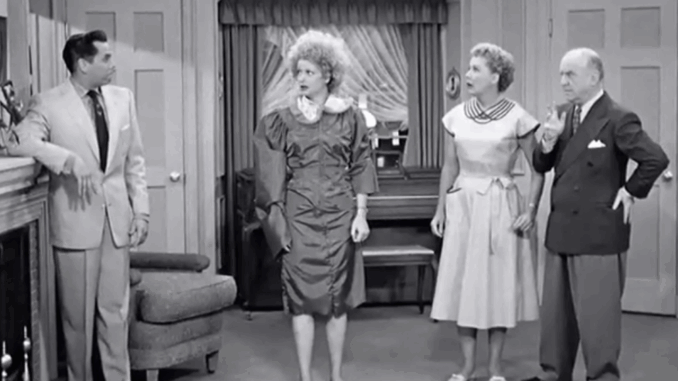
The success of is often attributed to the electric chemistry between its four stars: Lucille Ball, Desi Arnaz, Vivian Vance, and William Frawley. As Lucy and Ricky Ricardo’s grumpy, but ultimately lovable, landlords and best friends, Fred and Ethel Mertz, Frawley and Vance were the essential comedic anchors.
However, the creation of this iconic quartet was fraught with tension and a significant amount of doubt. Lucille Ball and Desi Arnaz were insistent on their primary casting choices, but when it came to the cantankerous Fred Mertz, Ball harbored a deep, professional mistrust of the man who would eventually embody the character: William Frawley. Her reservations were entirely rational, rooted in Frawley’s notorious reputation. Yet, over the course of the show’s run, Frawley’s sheer professionalism and dedicated performance didn’t just meet expectations—they soared past them, turning Ball’s initial skepticism into profound respect.
The Problematic Pedigree of William Frawley
In 1951, when was being cast, William Frawley was a Hollywood veteran, having appeared in over 100 films. However, his career was in a slump for two very public reasons that were well-known to the industry:
- A Volatile Temperament: Frawley had a reputation for being a curmudgeon and a difficult personality on set, with a famous incident involving him punching a fellow actor.
- A Notorious Drinking Habit: His fondness for alcohol was legendary and presented a major risk for a live, weekly television production. Network executives and sponsors, particularly Philip Morris, were extremely hesitant to hire a 64-year-old actor with such a volatile track record.
Lucille Ball, a consummate professional who was gambling her film career on a new medium, was intensely protective of her show. She needed reliability and discipline, and Frawley’s profile suggested the exact opposite. Ball and Arnaz’s initial choice for the role of Fred Mertz had been vaudeville veteran Gale Gordon (who would later appear on The Lucy Show), but he was unavailable due to other commitments.
Frawley, hearing about the role, took the bold step of calling Ball himself to ask for a chance. Ball and Arnaz were intrigued by his talent but terrified of his reputation. It was a risky proposition that needed a firm foundation of discipline.
Desi Arnaz’s Iron-Clad Ultimatum
The turning point came with a decisive intervention by Desi Arnaz, the business-savvy producer of the show. Arnaz, understanding the magnitude of the risk and the potential reward of Frawley’s unique comedic presence, laid down an iron-clad ultimatum.
According to various accounts, Arnaz told Frawley bluntly that he was aware of his reputation, particularly his drinking. He then gave the veteran actor a simple rule: If he was late to work, showed up intoxicated, or was unable to perform for any reason other than a genuine, verifiable illness, he would be written out of the show immediately and fired.
This non-negotiable condition, delivered to a seasoned actor whose career was on the verge of obsolescence, was the catalyst for Frawley’s miraculous professional transformation. Frawley, who was 64 and deeply aware this was likely his last major opportunity, accepted the terms without reservation.
The Redemption of a Professional
What followed was a nine-year run of extraordinary, unwavering commitment. William Frawley never once missed an episode of or its follow-up, , due to a lapse in professionalism. He was on time, prepared, and sober for every single taping.
Frawley’s performance as Fred Mertz was a masterclass in deadpan, curmudgeonly comedy. He was the perfect foil to Lucy’s frantic schemes and Ethel’s emotional drama. He brought an authentic, old-school vaudevillian quality to the show that grounded the Ricardos’ youthful exuberance.
- The Vaudeville Veteran: His background shone through in musical numbers, where he and Vivian Vance often sang and danced with a polished, classic style.
- The Grumpy Anchor: As the perpetually suspicious landlord, he provided a necessary layer of low-stakes conflict, questioning Lucy’s intentions with a perfectly timed raised eyebrow or a gruff, exasperated retort.
- The Heart Beneath the Scowl: Despite the cynicism, Frawley subtly infused Fred with a surprising warmth and loyalty, particularly in episodes involving Little Ricky, or when standing by his beloved—if often feuding—wife, Ethel.
A Mistrust Transformed into Loyalty
By the end of the show’s run, Lucille Ball’s initial professional mistrust of William Frawley had evaporated, replaced by deep respect and genuine affection. She and Desi Arnaz were immensely grateful for his consistency and the talent he brought to their production.
Ball became one of his most fervent defenders and cheerleaders. After ended, and Frawley’s health began to decline, Ball demonstrated her ultimate faith in him:
- Public Advocacy: She continually praised his skill, believing he was often underrated and should have won the Emmy Awards for which he was frequently nominated.
- A Final Farewell: In 1965, a year before his death, Ball ensured Frawley had a final, memorable television appearance on her follow-up series, . In the episode, “Lucy and the Countess Have a Horse Guest,” Frawley makes a brief cameo as a horse trainer. As the character walks away, Lucy Carmichael remarks, “You know, he reminds me of someone I used to know.” It was a heartfelt, knowing nod to the beloved Fred Mertz and the actor who had dedicated the final, most successful chapter of his career to her.
Lucille Ball’s initial judgment of William Frawley was understandable; the evidence against his reliability was overwhelming. However, Frawley, propelled by a final chance at professional stability, defied his own past. He proved to the most powerful woman in television that his commitment to the craft transcended his personal demons. In doing so, he became an indispensable part of a television masterpiece, turning a massive casting risk into one of the great professional success stories in entertainment history.